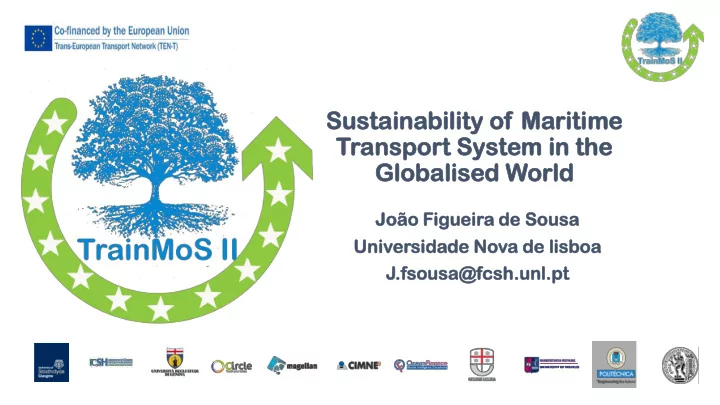

Sus ustaina tainabil ilit ity of of Ma Mariti ritime me Transpor ansport System stem in in the he Gl Glob obal alised ised Wor orld ld João ão Figueir ueira de Sousa sa Univer ersida sidade de Nova de lisboa sboa J.fsousa@fcsh.unl fsousa@fcsh.unl.pt .pt
Contents 1) Maritime Transport and Environmental Issues 2) Ports, Port Cities and Environmental Issues 4) Main Drivers in Terms of Environment 5) Revolution in the Energy Develoment 6) Recent Development of Shale Gas 7) Environmental Drive to Change the Paradigm 9) Impacts on ports and maritime transport
Specifics of port cities (port environment and maritime influence)
Specifics of port cities (port environment and maritime influence)
The OCDE Report about the Competitiveness of Global Port-Cities
The OCDE Report about the Competitiveness of Global Port-Cities
The OCDE Report about the Competitiveness of Global Port-Cities
Maritime Transport and Environmental Issues
United Nations Conference on Sustainable Development, Rio+20 • United United Nations Conference on Sustainable Development (UNCSD) was held in Brazil between 20-22 June 2012. High-level conference was attended by heads of State and Heads of Government, apart from other representatives.
The Objectives of the Conference - to secure renewed political commitment for sustainable development; - to assess the progress and implementation gaps in meeting previous commitments and to develop an approach to address emerging challenges; The Conference covered two major topics: (a) “green economy ” in the context of sustainable development and poverty eradication, and; (b)institutional framework for sustainable development
The Objectives of the Conference • IMO participated in the Rio +20 conference and discussed the contribution of international transport to the three pillars of sustainable development, • IMO also presented its vision of a framework for sustainable development of maritime activities: - Maritime transport is the most efficient and cost-effective method of international transportation for the majority of goods; - It provides reliable mode, low-price for global transportation of goods, facilitating the commerce and helping to create prosperity for the nations; - Highlighted significant contribution already made by the transport and the IMO for sustainability and various steps being taken in order to guarantee that maritime transport will continue to serve for the needs of growing global population, at the same time becoming more green and efficient
The Objectives of the Conference • IMO participated in the Rio + The concept and the Conference aim to provide a general vision of contribution of maritime transport system for environmental, social and economic dimensions of sustainable development. The theme was chosen in order to concentrate the efforts of IMO in 2013 on execution of commitments assumed at the United Nations Conference on Sustainable Development Rio +20, hosted in 2012 in Rio de Janeiro, Brazil. The World Maritime Day 2013 was held between 23-27 September.
Ports and Port Cities – Nodes of a Global Network
Specifics of Port Cities (port environment and maritime influence)
Specifics of Port Cities (port environment and maritime influence)
Specifics of Port Cities (port environment and maritime influence)
Specifics of Port Cities (port environment and maritime influence)
Specifics of Port Cities (port environment and maritime influence)
Specifics of Port Cities (port environment and maritime influence) Port cities represent main nodes of a Network of Flows: Physical (flow of ships and goods) Economic (commercial transactions) Service (insurance) Financial (banks, stock markets, financial operations) Information (concerning commercial transactions, transport chain ,…) Business Cities: World Trade and Maritime Transport
Drivers in Terms of Environment
Flow Management – Accessibility and Multimodality Operational tional Dimensio ension/ (techn hnic ics, , managem ement, nt, organi aniza zatio tion): Great morphological transformations that ports have been going through in the last 50 years are not limited to port areas exclusively. Occupation of greater areas, construction of new port infrastructures, development of rail and road connections with the hinterland and construction of logistics terminals or second-line terminals resulted in significant changes in terms of territory, affecting functional performance and landscape, relationships between ports and surrounding areas. Major or operato tors, , demand ands of of logi gistic stic chain ins, , the impor portanc tance of of informa ormati tion on ….
Enlargement of Ship Dimensions
Enlargement of Ship Dimensions
Enlargement of Ship Dimensions
Enlargement of Ship Dimensions
Cultural and Heritage Dimension Despite the fact that these issues have always gained much attention, soft values have been assuming greater significance in the approach to port-city relation, being considered as a major value in the strategies of port-urban development.
Environmental and Landscape Dimension: Associated to the new culture and the attitude of last generations which appreciate ecology and environment, and to the greater law enforcement and stricter legal standards at the national and international levels Climate Change – Impacts and means of adaptation
Logistics and Intermodality; Information Management; Energy (New Energy Sources and Low-Emission Shipping in the Baltic Sea region);
Revolution in the Energy Development
Revolution in the Energy Development - Consumption continues to grow... - Oil is loosing weight in the final energy consumption - Recent Development of Shale Gas - The Rise of Shale Gas - Changes at the Global Energy Map
Revolution in the Energy Development - En Envi vironm onment ental al drive e for a a chang ange - Ef Effec ects ts on on ports ts an and mar ariti time me tr tran anspor port
THE END Thank you for your attention João Figueira de Sousa j.fsousa@fcsh.unl.pt
Recommend
More recommend